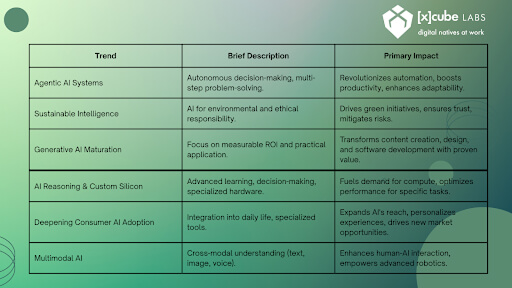 1-800-805-5783
1-800-805-5783 
The year 2025 marks a significant turning point in Artificial Intelligence (AI), as it transitions from foundational automation to sophisticated, autonomous systems deeply integrated into business strategies and everyday life. Organizations across various sectors are strategically leveraging AI to achieve optimized performance, enhanced profitability, and sustainable innovation. Let’s explore the key AI Trends defining this pivotal year.
To provide a concise overview of the transformative shifts underway, the following table summarizes the key AI Trends defining 2025, highlighting their core characteristics and primary impacts on industries and society. This serves as a roadmap for the more detailed discussions that follow, enabling a quick grasp of where strategic focus and innovation are concentrated in the evolving AI landscape.

Agentic AI stands out in 2025 due to its unprecedented autonomy, advanced reasoning, and real-time adaptability, aligning closely with prominent AI Trends. Unlike conventional automation, these systems independently manage complex tasks with minimal human intervention. Key industries benefiting from Agentic AI include:
Customer Service: AI-driven chatbots capable of resolving complex inquiries autonomously, providing personalized customer experiences, reflecting significant ai industry trends 2025. Supply Chain Management: Predictive analytics optimizing inventory management, resource allocation, and demand forecasting, highlighting the latest ai trends 2025. Manufacturing: Enhanced automation improves production efficiency and operational accuracy, driven by emerging AI Trends.
Prominent frameworks, such as LangChain, LlamaIndex, and AutoGen, facilitate the development of these autonomous systems, enabling seamless multi-agent collaboration, which is an essential component in AI technology trends 2025. However, despite their impressive capabilities, maintaining human oversight is crucial for ethical compliance and accuracy.
Sustainable intelligence has emerged prominently among top AI Trends 2025, with businesses increasingly deploying AI to address global sustainability challenges. Notable applications include:
Climate Modeling: AI-enhanced predictive models significantly enhance the accuracy of policy decision-making, a notable example of ai and machine learning trends. Precision Agriculture: Optimized resource utilization, minimizing environmental impact through AI-driven irrigation and pest control, further demonstrating latest ai technology trends 2025. Energy Optimization: Smart grids leveraging AI to integrate renewable energy efficiently, reducing dependence on fossil fuels, another key aspect of ai industry trends 2025.
India leads globally in adopting sustainable AI, with businesses embedding ethical practices through frameworks such as AI Trust, Risk, and Security Management (AI TRiSM), addressing transparency, bias mitigation, and data privacy, closely following ai ml industry trends 2025.
Generative AI, having evolved significantly within generative ai trends, is now delivering tangible business value across various sectors:
Marketing and Entertainment: Automated generation of multimedia content tailored to consumer preferences, closely aligned with ai marketing trends 2025. Software Engineering: Rapid code generation, automated testing, and quality assurance, substantially improving development cycles, indicative of ai technology trends 2025.
Tools like DALL·E, Midjourney, and Sora exemplify this shift, transforming industries by enabling rapid and high-quality generation of content in line with latest ai trends 2025.

The rise of advanced AI reasoning capabilities has increased the demand for specialized computing hardware, one of the significant AI Trends. Application-Specific Integrated Circuits (ASICs), specifically designed for AI workloads, offer superior performance and efficiency compared to general-purpose GPUs, fueling investment in custom silicon tailored for specialized tasks within ai industry trends 2025.
Consumer adoption of AI has expanded dramatically, representing one of the most noticeable AI Trends, with nearly two billion people integrating AI into their daily routines. AI tools are now prevalent among students, professionals, and households, emphasizing their role in education, productivity enhancement, and household management. This widespread adoption underscores the shift from novelty to mainstream utility as part of ai trends 2025.

Multimodal AI integrates multiple data formats—text, audio, visual, and sensor data—to enhance interaction and response capabilities, aligning with the latest ai trends 2025. Industries such as robotics, autonomous vehicles, healthcare, and manufacturing significantly benefit from multimodal AI, facilitating richer, more intuitive human-computer interactions.
Despite the immense potential, the widespread adoption of AI in 2025 presents significant challenges that organizations must proactively address to ensure a successful and responsible deployment, central to understanding AI Trends.
The Importance of a Data-Driven Culture:
A significant barrier to becoming a truly AI-driven organization is not primarily technological but cultural, aligning with ai marketing trends 2025. A striking 92% of survey respondents cited these challenges as the primary impediment. Generative AI has renewed focus on unstructured data, but human curation remains essential to transform this data into usable formats, a critical insight within generative ai trends.
This underscores that technology alone is insufficient; a supportive organizational culture, capable of adapting to new paradigms, is paramount for successful AI integration.
Strategic Recommendations for Businesses: To thrive amidst these dynamic AI Trends, businesses must adopt several strategic imperatives:
As AI matures from an emerging technology to an essential strategic asset, organizations that align AI initiatives with clearly defined business objectives, foster human-AI collaboration, and embrace robust ethical governance will be uniquely positioned to thrive. Navigating the complexities of AI requires proactive management of ethical, operational, and strategic challenges.
Embracing a data-driven culture and prioritizing workforce AI literacy are imperative steps toward sustainable AI adoption. Organizations that effectively integrate AI into their core operations and continuously innovate are well-positioned to achieve a lasting competitive advantage and sustainability.
The future of AI hinges not only on technological advancements but also on intelligent, ethical, and sustainable deployment that serves humanity responsibly. As we move beyond 2025, the imperative for businesses is clear: strategically embrace AI, ethically manage its implications, and continuously innovate for sustained success.
1. What are Agentic AI Systems, and how do they differ from traditional AI?
Agentic AI systems autonomously manage complex tasks with minimal human intervention, unlike traditional AI, which usually handles predefined, simpler tasks. They can independently adapt and make sophisticated decisions in real-time.
2. How can Sustainable Intelligence positively impact businesses?
Sustainable Intelligence enables businesses to optimize resource use, reduce environmental impact, and enhance ethical decision-making, addressing global challenges like climate change and energy management effectively.
3. What industries benefit most from Generative AI?
Industries like marketing, entertainment, software engineering, and content creation see significant benefits from Generative AI, streamlining workflows, accelerating content creation, and enhancing personalized consumer experiences.
4. What challenges should businesses anticipate when adopting AI?
Businesses may face challenges like data privacy concerns, integration with legacy systems, computational costs, legal uncertainties, biases in AI models, and managing stakeholder expectations regarding AI capabilities.
5. How does [x]cube LABS help businesses effectively integrate AI?[x]cube LABS develops intelligent AI agents including virtual assistants, RPA for automation, predictive analytics, and generative AI content tools to seamlessly integrate into business processes, driving efficiency, innovation, and superior customer experiences.
At [x]cube LABS, we craft intelligent AI agents that seamlessly integrate with your systems, enhancing efficiency and innovation:
Integrate our Agentic AI solutions to automate tasks, derive actionable insights, and deliver superior customer experiences effortlessly within your existing workflows.
For more information and to schedule a FREE demo, check out all our ready-to-deploy agents here.